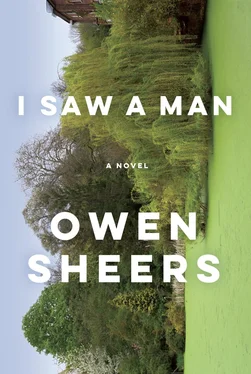Samantha looked at her watch. “I should go,” she said. She extended the handle of her case. “I’ll give you a ring when we’re back,” she said, flashing him another smile, warmer than before. “Bye, Michael,” she said, walking away. “And thanks again.”
“Bye,” he said as she went, raising a hand to wave her off. Samantha waved back, calling over the heads of the crowded pavement between them. “I’ll bring Rachel round,” she said, standing on tiptoe. “I’m sure she’d like to see you.”
ON THE MORNING of September 16, 2008, news channels across the world showed footage of Lehman Brothers employees leaving their offices in Canary Wharf, carrying boxes of files and belongings. The crisis had been building for weeks, and Josh had known they wouldn’t escape it. His team, and the whole London office, had always remained profitable. But he knew the country of finance wouldn’t be sensitive to such details, or to any concepts of national borders. The bonds bets in the U.S. had failed. Construction work across thousands of hectares of developments on the fringes of Las Vegas and Miami had come to a halt. A few days later Josh had stood on the trading floor along with hundreds of other Lehman’s employees, all of them going silent as they’d watched their stock plummet. From then on the building in Canary Wharf had been coursing with the chatter of exit: heads of teams leaving rooms to make phone calls, younger traders calculating with whom they should align.
When the end came, it came swiftly. Within a week of a meeting with the U.S. Federal Reserve in New York, the bank no longer existed. Josh heard the news on the radio as he was making himself breakfast. He’d expected it to be bad, but not this bad. He hadn’t thought the bank would die altogether. By the time he got in to the office he’d found his colleagues were already vacating the building, walking to cabs or the underground station carrying Iron Mountain data boxes, bin liners, shopping bags, desk plants.
From his office on the thirtieth floor, Josh watched as a crescent of camera crews covered his colleagues’ departures, tracking them like flowers following the sun. If he was going to find another position, he knew he should already be making phone calls, setting up lunches. It wouldn’t be difficult. He was good at what he did, and people knew he was good. It was the bank that had failed, not him. But instead he remained by the window, the phone on his desk unplugged and his mobile turned off.
Eventually Josh turned from the scene below. Checking his drawers one last time, he picked up his briefcase and left his office, asking his secretary, who was clearing her own desk, to courier the box of his personal items to his new flat in Hampstead. Taking a service elevator, he descended through the floors, which just a few days ago had hummed with activity, and left by a side entrance of the building. He didn’t want to give the cameras, or anyone else, the satisfaction. But more important, beyond any professional pride, Josh didn’t want Rachel to turn on the TV and see her father losing his job in the same way she’d already seen him lose her sister, his wife, and his home.
Stepping out into the light, Josh walked west, along Middle Dock. The sun was catching the higher windows of the towers and flexing in brilliant flashes on the water beside him. He thought of the view from Parliament Hill, how from up there these towers, the facets of their pinnacles, sparked from the city like small explosions. Maybe he would go there today. He hadn’t been on the Heath in months. But perhaps today he would. Suddenly he had the time, the space. He loosened his tie as he walked, then took it off altogether. Yes, he’d like to feel the wind up there again. To see it shuffle the trees like a card dealer, to hear it bring the oceans to the branches of an oak.
But first he’d go for a drink. Not here, but somewhere farther north. A pub up towards Mile End or Bow. A quiet, midday boozer, dark with close walls. Or perhaps one of the old all-day strip joints, its windows boarded over and its drinkers, from company director to delivery driver, levelled by the clink of their coins in the pint glass. Or maybe he’d just buy a bottle of Teacher’s and take it to a bench by the canal. Somewhere he wouldn’t have to look at the faces of others. Somewhere where nobody knew him; where he could forget, for an hour or so, who he was and who he’d been.
―
The flat to which a courier drove Josh’s boxes later that day was in a Victorian terraced house on the east side of the Heath, set back two streets from its edge. An attic conversion of a bedroom, living room, bathroom, and kitchen with Velux skylights in its sloping roof through which Josh smoked at night, looking over the chimneys and eaves of his neighbours. It was the kind of flat one of his more affluent juniors might have rented, fresh from university. A first-timer’s flat. Neat, minimal. A starting place. But for Josh, on moving in, it had felt like an end. A contraction of his hopes and everything for which he’d ever worked and loved to three cramped rooms with predictable furnishings and an air of bland expense.
He’d chosen it simply because it was available, and for its proximity to South Hill Drive. This was the only stipulation he’d given the letting agent. Nowhere more than ten minutes from his home. From Rachel and Sam. He’d agreed to leave the house, but that didn’t have to mean leaving their lives. He understood why he had to go. It was becoming unbearable. The way Samantha looked at him each morning, her face thickened with blame. Having to see those stairs every day, to walk down them and see, in his mind’s eye, Lucy caught in their turn like driftwood between rocks. That’s why he’d stayed away so much, why he’d drunk so much. He wanted to be nowhere other than home, where he could keep Rachel and Samantha close. But when he was there, he couldn’t stand it. Every brick, every chair, every picture, was a part of the canvas of Lucy’s death, and his contribution to it. And not just her death, but her short life, too. These were the rooms in which he had first held her, her newborn eyes still welled with the womb’s darkness. Where he’d watched her infant sleep, hovering his open hand above her stomach to feel it rise and touch his palm with a breath. Where he had witnessed her growing delight in her childhood discovery of being alive. Loaded with these past visions, and more terrible recent ones, too, Josh’s home, once his refuge, had become inhospitable, a wilderness of guilt, grief, and regret. So when Samantha had said she wanted him to leave, that she wanted time apart, he’d offered barely any resistance. It was, beyond the sadness of the action, of carrying those two suitcases out the door, a release. And, he’d thought, as he’d unpacked those cases in his new attic rooms, the only way, in the end, they might stay together.
But if Josh’s moving out gave Samantha the space she needed, it did nothing by way of helping him find his own. He felt trapped between what he had done and what he hadn’t, between what he’d said and what he hadn’t said. A corrosive cocktail of self-loathing and grief continued to eat at him from within. And within was the only place it could be. There was nowhere else for it to go. No one else to whom he could explain or confess. He had left the house. He had not been there. And why? For his secret conquering of Tony’s assured world. For the thrill of it. And just because he could. Because in letting him do so Maddy had intoxicated him, not with beauty or allure, but with the simple reveal of her ordinary self behind that impossible façade. But none of that mattered now. All that did was that Josh had left Lucy alone. The only other person who knew was Maddy herself, and she’d already gone, distancing herself as fast as she could the moment she heard what had happened.
Читать дальше











